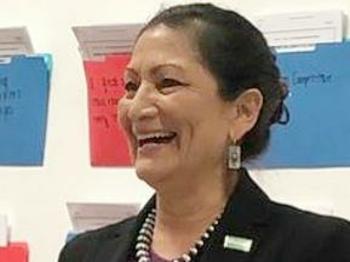
WASHINGTON, DC, January 13, 2021 (ENS) – President-elect Joe Biden, who takes office on January 20 at noon, has nominated a team of seasoned environmental leaders to fill his Cabinet in positions that will impact the Earth’s unique places, people, and species, now more vulnerable than ever after the Trump administration. Climate will be a top priority of Biden’s core plan for a “clean energy revolution and environmental justice.”
Biden is aware that on January 20, according to the Intergovernmental Panel on Climate Change, only nine years will be left to stop the worst consequences of climate change.
Because there’s no time to waste, Biden says he will, “Take executive action on Day 1 to not just reverse all of the damage Trump has done, but go further and faster.”
Biden plans to require aggressive methane pollution limits for new and existing oil and gas operations and rigorous new fuel economy standards aimed at ensuring 100 percent of new sales for light- and medium-duty vehicles will be net-zero emissions.
As President, Biden has promised to permanently protect the Arctic National Wildlife Refuge and other public areas impacted by President Donald Trump’s attack on federal lands and waters. Biden says he will ban new oil and gas leasing on public lands and waters.
In his first year in office, Biden pledges to work with Congress to enact, legislation that, by the end of his first term, puts the country on “an irreversible path to achieve economy-wide net-zero emissions no later than 2050.” Biden wants to require polluters to bear the full cost of the carbon pollution they are emitting.
Biden has promised to invest $400 billion over 10 years in clean energy and innovation, as part of a broad mobilization of public investment. He wants to establish ARPA-C, a new research agency focused on accelerating climate technologies.
To carry out these and other restorative and protective policies, President-elect Biden has chosen a solid core of administrators with strong environmental credentials.
For Special Presidential Envoy for Climate: Former Secretary of State John Kerry
Secretary of State in the Obama-Biden Administration from 2013 to 2017, John Kerry will head the Biden administration’s climate team as Special Presidential Envoy for Climate.

An attorney and former naval officer, Kerry first drew public attention as a decorated Vietnam veteran turned anti-war activist.
As Secretary of State, Kerry elevated environmental challenges as diplomatic priorities, from oceans to hydrofluorocarbons. He was a key architect of the Paris Climate Accord and signed the historic agreement to reduce carbon emissions in 2015 with his granddaughter on his lap.
Now, Kerry will fight climate change full-time, and in this newly created Cabinet-level position, he will sit on the National Security Council. This marks the first time that the NSC will include an official dedicated to climate change, reflecting President-elect Biden’s commitment to addressing climate change as an urgent national security issue.
“America will soon have a government that treats the climate crisis as the urgent national security threat it is,” Kerry said on Twitter soon after the November 23 announcement of his new role. “The climate crisis demands nothing less than all hands on deck.”
In remarks at the Massachusetts Institute of Technology in 2017, Kerry said, “Glaciers are melting at an unprecedented rate. Sea levels are rising three times faster than they did in the 20th century. The kind of intense storms that used to happen only twice or three times in a millennium are now becoming almost normal.”
For more on Kerry’s background and approach to his new position, please see the ENS report “John Kerry to Head Biden Administration’s Climate Team.”
For Secretary of the Interior: Congresswoman Debra Haaland
The President-elect has nominated Congresswoman Debra Haaland as his Secretary of the Interior. She is a member of the Laguna Pueblo, a federally recognized Native American tribe who live near the city of Albuquerque, New Mexico.
Haaland was elected in 2018, one of the first two Native American women to be voted into the U.S. Congress. Now, she will make history as the first Native American Interior Secretary and the first Native American Cabinet Secretary.

Haaland currently represents the 1st District of New Mexico, which includes the city of Albuquerque and its suburbs. She now serves as vice chair of the House Committee on Natural Resources and vice chair of the Democratic Women’s Caucus, among other leadership positions.
Looking back over her two-years in the House, Haaland gives herself credit for environmental progress. She introduced the THRIVE Agenda to rebuild the “broken” U.S. economy by “investing in dignified jobs, environmental protections, and prioritizing marginalized communities.”
As chair of the House Subcommittee on National Parks, Forests, and Public Lands, Haaland introduced a revised Antiquities Act to protect national monuments from extractive industries and honor sacred sites.
She guided the Great American Outdoors Act through the House and into law to secure permanent funding for the Land and Water Conservation Fund and address the National Parks maintenance backlog.
Haaland defended the “sacred Arctic National Wildlife Refuge from frivolous oil and gas development” by cosponsoring the Arctic Cultural and Coastal Plain Protection Act. The bill passed in the House and died in a Senate committe.
She helped to pass the Chaco Cultural Heritage Area Protection Act in the House to prevent oil and gas development around Chaco Canyon National Historical Park in northwestern New Mexico, as well as securing provisions in appropriations bills to continue the current moratorium on drilling there.
A longtime organizer, Haaland has spent her career fighting for families, including in tribal nations, rural communities, and communities of color. As a single mom and someone who has lived paycheck to paycheck, Haaland knows the struggles many families face.
Before her election to the U.S. House of Representatives, Haaland was an entrepreneur and advocated for environmentally sustainable business practices. She served as chairwoman of the New Mexico Democratic Party, the first Native American elected to lead a state party.
Haaland, whose mother served in the Navy and whose father was a Marine, also serves as an Honorary Commander of Kirtland Air Force Base. She earned an undergraduate degree from the University of New Mexico and a law degree from the University of New Mexico School of Law.
For Secretary of Energy: Former Michigan Governor Jennifer Granholm
Jennifer Granholm served as Michigan’s 47th governor for two terms, 2003-2011, and was the first woman to lead the state in its history. During her tenure, she oversaw the statewide response to the Great Recession, working closely with the Obama-Biden Administration to rescue the U.S. auto industry – a feat credited with saving one million American jobs.

Granholm’s chief focus as governor was on retooling and electrifying the auto industry to prepare it for durable global leadership and in-state job growth. Her efforts to diversify the Michigan economy by sparking a new clean energy sector have served as a state and national model for future economic and job growth, the Biden transition team said.
With her husband, Daniel Mulhern, Granholm authored “A Governor’s Story: The Fight for Jobs and America’s Future,” released in 2011.
Before she was governor, Granholm was elected to serve as the attorney general of Michigan, and was the first woman to hold this position.
After leaving public office, Granholm took a position at University of California, Berkeley teaching courses on clean energy, policy innovation and communication.
She has helped drive clean energy policy nationwide as an advisor to the Pew Charitable Trusts’ Clean Energy Program and as a professor at the University of California, Berkeley Goldman School of Public Policy.
“I’m so grateful to Berkeley and the Goldman School of Public Policy for giving me the ability to access great research talent and fabulous grad students passionate about clean energy,” said Granholm. “I will carry their hopes for a clean energy future with me to Washington, and if I’m confirmed, will focus with zeal on deploying clean energy in every pocket of the country, with an emphasis on communities that have been hardest hit by economic, racial and environmental injustice.”
Granholm is affiliated with the California Institute for Energy and Environment and the Berkeley Center for Information Technology Research in the Interests of Society, where she is a senior research fellow.
She is the founder of the American Jobs Project, a multi-state, multi-university initiative promoting technological advancements and clean energy policies to spur U.S. job creation.
An immigrant from Canada who has been a U.S. citizen for more than 40 years, Granholm received her undergraduate degree from University of California, Berkeley, and her law degree from Harvard Law School.
If confirmed, Granholm will oversee 17 national laboratories, a wide range of energy research initiatives and the National Nuclear Security Administration, which is the agency within the Department of Energy that oversees the nation’s nuclear stockpile.
For Environmental Protection Agency Administrator: Secretary Michael Regan
Currently North Carolina’s top environmental regulator, Michael Regan serves as Secretary of the North Carolina Department of Environmental Quality. During his four years at the agency, he created the state’s first Environmental Justice and Equity Board and earned the respect of environmental groups by standing up to polluters.
Regan is a former air quality specialist with the U.S. Environmental Protection Agency. He served at the EPA for nine years under both Democratic and Republican presidents – Bill Clinton and George W. Bush – leading initiatives to improve energy efficiency and air quality and reduce pollution.

In the Biden Administration, Regan will run the entire agency.
He faces rebuilding an EPA devastated by deregulation, staffing cuts, and control by industry lobbyists during the Trump administration.
But Regan has his eyes on an even bigger challenge.
“Climate change is the most significant challenge humanity faces. We’ll make meaningful progress together by listening to every voice – from our youth & frontline communities to scientists & our workforce. I will be honored to be part of that work as EPA Administrator,” Regan said on Twitter on December 18, the day after President-elect Biden announced his nomination.
Regan’s nomination was endorsed by the Environmental Protection Network, an organization composed of former EPA appointees and career staff created to oppose the Trump administration’s efforts to roll back environmental regulations and “preserve the nation’s bipartisan progress toward clean air, water, land and climate protection.”
Regan, who is Black, promises a focus on environmental justice as basic to his work in the Biden Administration, saying, “We will be driven by our convictions that every person has the right to clean air, clean water and a healthier life, no matter how much money they have in their pockets, the color of their skin or the community they live in.”
At the North Carolina Department of Environmental Quality, the focus of his work has been to bring a deep understanding of the interconnectedness of the environment, economy, and public health
Secretary Regan conceptualized and operationalized North Carolina’s Executive Order 80, a landmark effort to address climate change’s impact and transition the state’s energy economy.
Regan led the negotiations that resulted in the cleanup of the Cape Fear River, which had been contaminated with per- and polyfluoroalkyl polluting substances.
He negotiated and oversaw the largest coal ash cleanup in the United States, and created North Carolina’s first Environmental Justice and Equity Advisory Board to address societal disparities exacerbated by environmental issues during his tenure as Secretary.
Focused on climate issues, Regan is a former associate vice president of the nonprofit New York-based Environmental Defense Fund. He also founded M. Regan & Associates to help organizations navigate issues at the nexus of energy, the economy, and the environment.
Regan earned his bachelor’s degree from North Carolina Agricultural and Technical State University and his master’s degree from George Washington University.
For Chair of the White House Council on Environmental Quality: Brenda Mallory
A veteran public servant and environmental lawyer, Brenda Mallory served as a top EPA lawyer and as General Counsel on the White House Council on Environmental Quality during the Obama-Biden administration.

When confirmed by the Senate, to be controlled by Democrats after January 20, Mallory will be the first African American to hold the position of Chair of the White House Council on Environmental Quality, CEQ, since it was created more than 50 years ago.
She told Reuters in an interview that she hopes the CEQ would reverse changes made by the Trump administration to the National Environmental Policy Act, NEPA, an environmental permitting law that Trump used to speed approval of big energy infrastructure projects.
“I am hoping at top of the priority list for CEQ is addressing changes Trump made to how CEQ implements NEPA,” she said.
Mallory now fills the post of Director of Regulatory Policy at the nonprofit advocacy group Southern Environmental Law Center with its 80+ lawyers..
A longtime champion of environmental stewardship, she has been an environmental leader at the intersection of law and policy in the public, private, and nonprofit sectors for over 30 years.
Before joining the Southern Environmental Law Center, Mallory served as Executive Director and Senior Counsel at the Conservation Litigation Project, where she led efforts to protect public lands and promote scholarship around emerging natural resources issues.
She also served as Chair of the Natural Resources Practice Group during her time at the environmental law firm Beveridge & Diamond.
A Connecticut native, Mallory is a graduate of Yale College and Columbia University School of Law.
For National Climate Advisor: Former EPA Administrator Gina McCarthy
The first National Climate Advisor to head the newly formed White House Office of Domestic Climate Policy will be veteran environmental administrator Gina McCarthy, who has been at the forefront of U.S. environmental and public health progress in a range of leading roles for over 30 years.

In her time as head of the U.S. Environmental Protection Agency, EPA, in the Obama-Biden Administration from 2013 to 2017, McCarthy ushered in a shift in national environmental policy, which linked it to global public health. McCarthy pursued innovative collaborations with the United Nations and the World Health Organization, and on global efforts to address pollution.
As EPA Administrator McCarthy oversaw successful efforts to reduce greenhouse gases, lower air pollution, conserve critical water sources, and safeguard vulnerable communities from chemical hazards.
She spearheaded the Obama-Biden Clean Power Plan, which set America’s first-ever national standards for lowering carbon emissions from power plants, and helped pave the way for the Paris Climate Agreement, adopted by 196 governments in 2015.
Earlier in her career, McCarthy advised five administrations of both Democratic and Republican Massachusetts governors on environmental matters, and she served as Commissioner of the Connecticut Department of Environmental Protection before she was appointed by President Barack Obama to head up the EPA’s Office of Air and Radiation.
Most recently, in January 2020, McCarthy took on the role of president and CEO of the nonprofit Natural Resources Defense Council, NRDC, leading the more than 700 attorneys, scientists, advocates, and policy experts that make NRDC an effective environmental action organization.
Before she took on her present role with the NRDC, McCarthy was a professor at the Harvard T.H. Chan School of Public Health and currently serves as chair of the board of directors of the Harvard Center for Climate, Health, and the Global Environment.
In a 2018 interview with the “Harvard Gazette,” McCarthy explained how she can keep a positive attitude towards environmental protection after four years of the Trump administration dismantling much of what she accomplished as EPA administrator.
“I’ve seen ebbs and flows and I think that the challenges we’re facing now are extreme – I don’t minimize those,” McCarthy said, “but if you don’t get up every day with a positive message and a can-do attitude, then you might as well have admitted defeat. And I’m not big on admitting defeat when I think that the futures of my kids and grandkids are at stake.”
“I also think there are lots of reasons to be hopeful,” she said. “The federal government is clearly stepping aside on many of the protections that we value, but it’s just a matter of time before people speak up. I think it’s our job to make it clear to them what we’re losing and how we need to move forward.”
Born and raised in Boston, McCarthy holds a master’s degree in environmental health engineering and planning and policy from Tufts University and an undergraduate degree in social anthropology from the University of Massachusetts at Boston.
“We have no time to lose,” President-elect Biden said in November. “I need a team ready on Day One to help me reclaim America’s seat at the head of the table, rally the world to meet the biggest challenges we face, and advance our security, prosperity, and values. This is the crux of that team.”
Copyright Environment News Service (ENS) 2021. All rights reserved.
© 2021, Environment News Service. All rights reserved. Content may be quoted only with proper attribution and a direct link to the original article. Full reproduction is prohibited.



